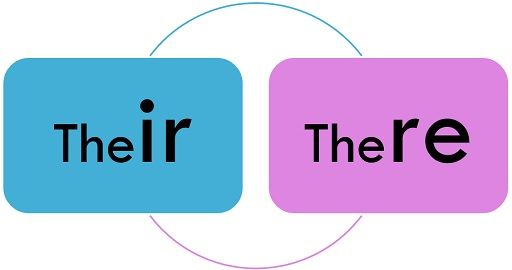 The words there and their are often used incorrectly because they are homophones, due to which they sound similar but have different spelling and meaning. While the word ‘there‘ has a number of uses but it is commonly used to refer a place, or something which exists whereas we use ‘their‘ to mean belongingness to a group of people. Now come let’s understand the two, with the help of examples:
The words there and their are often used incorrectly because they are homophones, due to which they sound similar but have different spelling and meaning. While the word ‘there‘ has a number of uses but it is commonly used to refer a place, or something which exists whereas we use ‘their‘ to mean belongingness to a group of people. Now come let’s understand the two, with the help of examples:
- There is a drawer in the almirah, where you can find all their stuff.
- Their teacher called me over there.
In these sentences, the word ‘there’ is indicating a place while ‘their’ is used to means ‘belonging to a group of people’. Take a read of this article to understand the difference between there and their.
Content: There Vs Their
Comparison Chart
| Basis for Comparison | There | Their |
|---|---|---|
| Meaning | The word 'there' represents a place or it can also be used to refer something that exists. It also acts as an exclamation. | The word 'their' symbolizes belongingness or ownership of someone or something. |
| Pronunciation | ðɛː | ðɛː |
| Part of Speech | Noun, Pronoun, Adverb, Adjective, Interjection. | Possessive Determiner |
| Examples | There is a big mall. | Their fight remind me of my childhood. |
| You must go there for further studies. | Can you give me their number? | |
| There are certain bugs in the software. | The employees efforts can be seen in their performance. |
Definition of There
The word ‘there’ is used in different contexts, when used as different parts of speech in various sentences.
- When used as an adverb, it means in or at that place, a point in time, or a particular matter or seeking attention:
- I will be there on time.
- She was there to meet you.
- There he comes.
- I stopped there, to let him reach.
- It can also be used as an interjection to show a feeling of satisfaction or calling attention:
- There, I told your parents would get angry after knowing your result.
- It can be used as a pronoun to introduce the subject or to say that something exists or does not exist:
- There is someone at the door calling your name.
- There are some differences between management and administration.
- As an adjective to give emphasis:
- You can ask for the coupons for the volunteer there.
- The girl over there is very cute.
- As a noun it refers to the place:
- There you can find Robin.
- Can you reach there by 7 AM?
Definition of Their
Simply put, the word ‘their’ is used in sentences as an attributive adjective, followed by a noun. It expresses the possessive form of the word ‘they’ which is a plural pronoun. Now let’s discuss where to use their in our sentences:
- As a determiner to show belongingness:
- She returned them their basketball.
- The villagers live in their huts.
- You should stop intervening in their matters.
- It may also be used when the gender of the person is not known:
- Someone has stolen their phone.
- My friends parked their car in the parking lot.
Key Difference Between There and Their
The points given below are substantial so far as the difference between there and their is concerned:
- In English, there is used to express a place which is already mentioned or implied which is known to the other person. It may also be used to express a specific object or person. On the other hand, their is a possessive form of ‘they’, that signifies ownership of something by a group of people.
- Basically, there is used as an adverb of place or position, but it can also be used as a noun, pronoun, adjective, and interjection. As against, their is a possessive determiner, which refers to belongingness to someone or something.
- Example: There must be something wrong with their behaviour.
You are going there for their well being.
Examples
There
- There you go.
- There are some horses in the stable.
- Are you there?
Their
- Their suggestion actually helped me.
- Their happiness depends on their mood.
- I like their attitude.
How to remember the difference
The best way to remember the difference is that whenever you use there it either means a location or something that exists. On the other hand, you use their when you refer to a noun which it replaces.






Usman Abba says
I really appreciate it.